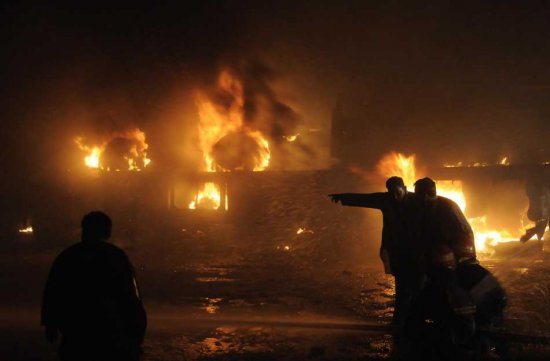In the latest suicide bombing to target high-profile regional officials, Kandahar Police Chief, Khan Mohammad Mojahid, has been killed along with his deputy and the anti-terrorism chief of Kandahar Police. The incident has come on the heels of a major operation by Afghan and foreign forces against Taliban hideouts scattered in the areas close to the border with Pakistan. Kandahar has been a priority city on the list of Afghan and foreign forces to beef up the security in and around the city, especially after recent combing operations that drove out Taliban fighters and made their sympathizers go underground.
The incident has once again shown the continued vulnerability of security structure even in the most protected cities and areas where thousands of Afghan and foreign troops stand guard. The Taliban have repeatedly shown that they still can attack at will and able to include high-value targets such as a provincial police chief in their list. This does not bode well for the people and government when the 2014 deadline of handing over the security provision to Afghan forces is drawing near and the continued resilience of the insurgency and its momentum.
In recent months there has been a marked shift in the strategies that the Taliban employ in their war against the government and security forces. The Taliban have clearly embarked on targeting high-ranking government officials and community elders throughout the south and eastern belt where the insurgency rages on. This campaign of terror is well premeditated and is carried on systematically with the eventual objective of weakening the government's presence in vast areas and subjugating the will of the local populations to Taliban and their shadow rule.
In the task of preventing suicide bombings such as the one witnessed on Friday in Kandahar, more than the role of the regular security forces, it is the role of the intelligence agencies that matter the most. Suicide bombings such as the one witnessed yesterday are planned weeks and months in advance often across the border and when the potential high-value targets such as provincial-level official is identified, preparations are made, suicide bombers assigned and surveillance done to prepare for the operation. Intelligence agencies such as the National Security Directorate (NDS) and provincial polices' intelligence units in the first place and those of the coalition forces have the primary responsibility of detecting the plans in advance through their networks of local informers who infiltrate the Taliban and other insurgent groups or their electronic and "signals" intelligence operations.
After "actionable" intelligence is obtained, efforts are launched to foil the bombing operations. The NDS with its provincial offices has been able to improve its organizational and operational capabilities significantly in recent years. However, much remains to be done concerning increasing the functional capabilities of the NDS and its provincial field offices at a time when the Taliban insurgency is at its peak.
The task of obtaining accurate and "actionable" intelligence is especially difficult when the main bases of operation of the insurgency remain outside borders and inaccessible to them. The Friday's incident in Kandahar city shows yet again the failure of the security provision structure most notably the concerned intelligence agencies charged with detecting and foiling the major suicide bombings that target such high-profile officials. The cooperation with Pakistani authorities across the border in terms of intelligence sharing and action against insurgent groups and terrorist cells proves to be extremely important.
As of now, there have been improvements in mutual interaction with the Pakistani army units stationed across the border and their overall military command. Without the other side's active support in hunting down Taliban leaders across the border, Taliban and their allies' war machine cannot be stopped or defeated.
Relations between Afghanistan and Pakistan have a direct impact on the war against the Taliban and their allies. Rising to the challenge of a burgeoning extremism and militancy on both sides of the border is no doubt the most important shared duty confronting the two countries. Afghanistan's struggle with extremism and militancy in the form of fighting a Taliban insurgency, alongside the international coalition, has now entered its tenth year. Pakistan, on the other hand, faces a rising homegrown tide of extremism while a fundamentalist reading of Islam is increasingly appealing to masses of disenchanted youth. It is incumbent upon Afghanistan and Pakistan to closely cooperate and collaborate with one another, pool resources and expertise in order to meet their common enemies before the time runs out.
There is ample room for collective cooperation between Afghanistan and Pakistan in combating these common enemies. Overcoming the barriers of distrust and deficit of confidence in bilateral relations between the two countries, backed by an international consensus on this matter, is the crucial first step.
Engaging in bilateral meetings and extensive cultivation of relations at the highest levels by the two governments, supported by such important regional and trans-regional countries such as India and the U.S., allows for mutual confidence and increased cooperation. The regional dimension of Afghanistan-Pakistan relations is of critical importance in the outcome of any bilateral engagement.
The India-Pakistan hostilities and rivalries have proved to have direct impact on the situation in Afghanistan. Pakistan's apprehensions regarding the role of India in Afghanistan can be allayed only through extensive consultations. In sum, the event in Kandahar in which the provincial police chief was killed should be another wake-up call to the government in Kabul to engage its Pakistani counterpart and make them committed to eliminating infrastructure of insurgency in their border areas.

